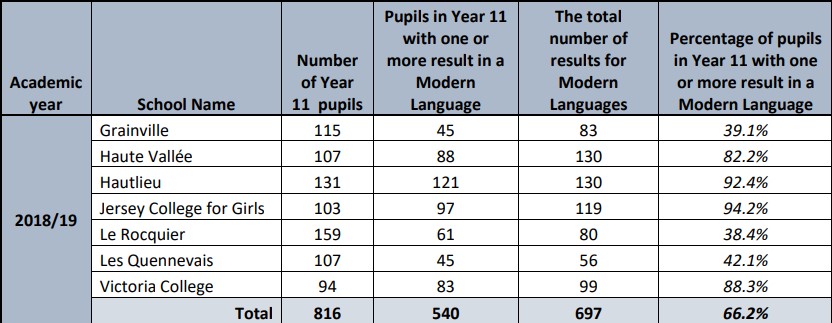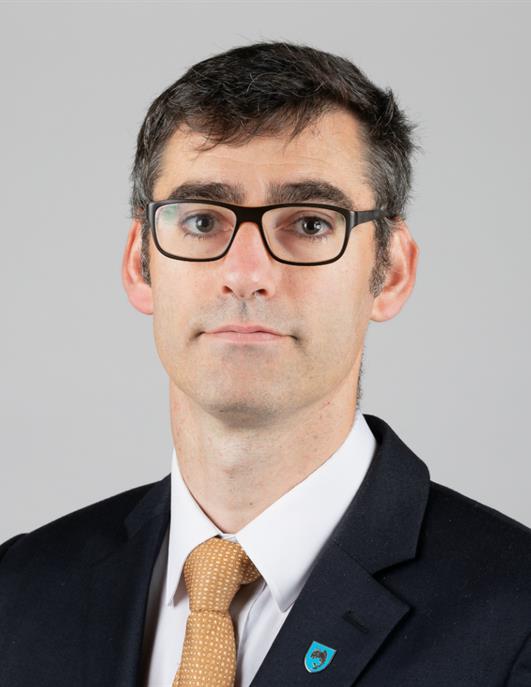


Qualifications in a second language should be compulsory, a backbench politician has said, after it emerged that the number of Year 11 students with a modern language GCSE has decreased over the past five years.
Deputy Monty Tadier, who is also president of the Assemblée Parlementaire de la Francophonie’s Jersey Branch, said that he was looking to work closely with Government schools to determine resourcing and how languages were valued in the curriculum before he takes the idea to the States Assembly.
Earlier this month, Deputy Tadier submitted a written question to Children's and Education Minister Inna Gardiner, asking for the number of entries for Modern Foreign Languages at GCSE level for each of the last five years, broken down by school, and the percentage of overall school population with a language GCSE.
The response revealed that there has been an overall decrease in percentage of pupils with one or more modern language GCSE results, falling from 66.2% in 2018/19 to 55.5% in 2022/23.


Pictured: Where 540 pupils in Year 11 had a foreign language qualification in 2018/19, only 455 had last year.
The breakdown by school showed that at some institutions, the number had dropped more sharply. For example, the largest decline could be seen at Haute Vallee, where the 88 students who took a language in 2018/19 had more than halved to 40 students in 2022/23.
One school saw an increase in the total number of GCSE results for modern languages, with the number at Les Quennevais rising from 56 to 67.
Deputy Tadier acknowledged that factors such as staffing and funding could affect the differences between schools, saying: "If you're a parent and you want your children to do languages, there are certain schools you might send them to, perhaps where they are compulsory or where there is a bigger language department.
"Sometimes it is simply school policy and a high uptake is indicative that the school has a requirement for their students to do a foreign language GCSE."

Pictured: Deputy Tadier, a St Brelade Deputy, has used previous terms to encourage higher take-up of language qualifications.
He added: "There has been a language strategy launched last year, so I accept there's a lot of good work going on from Government to do with all languages.
"But I do want to ask why a second language is no longer compulsory at GCSE and I would like to get back to the point where it is.
"It also means that children that already have another language under their belt should be offered the option to do another. It is all about trying to move away from the general problem in the anglophone world of monolingualism.
"There's a strong argument as to why French should remain a special language for the island, but any European or world languages that people might want to learn are important for the island and our connection to the world.
"What I'm looking to do is work closely with Government schools. We can't go in there and impose a solution, but we need to look at resourcing and how languages are valued in the curriculum.
"It may take a few years to get to where a language is a compulsory, core subject. I understand that all schools have different pressures and demographics as well."
This is reflective of a wider trend in the UK where entries for GCSEs in languages stands at less than 60% of those in the peak year of 2001.
The decline in the number of pupils taking modern foreign languages at GCSE dates back to the UK government’s decision to make the subject optional from 2004.
In March of this year, the UK government even awarded an almost £15 million contract to tackle the systemic decline in the number of pupils in England taking foreign languages at GCSE and A-level.
Following the latest hearing of the Children, Education and Home Affairs Scrutiny Panel, Deputy Gardiner has revealed further information about languages GCSEs and their pass rates:

Comments
Comments on this story express the views of the commentator only, not Bailiwick Publishing. We are unable to guarantee the accuracy of any of those comments.